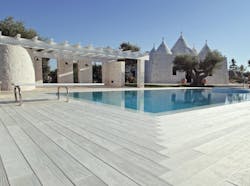Homeowners clamoring for the look of wood are benefitting from the recent proliferation of modified wood products, whose innovative technology improves the performance of the natural material without the use of chemical preservatives.
Modified wood products use one of several different technologies (thermal modification, acetylation, or furfurylation) that, in general terms, alter the internal makeup of the wood in a way that lessens or even eliminates its reaction to moisture and its attractiveness to insects. Thus, a traditional species such as pine achieves the performance levels of a tropical hardwood without the need for treatments or coatings.
Here is a look at several of the available modified wood products:
Kebony
Kebony is made with a process called furfurylation, in which the wood is impregnated with furfuryl alcohol (obtained as a byproduct from other industries), soaking the wood cells. The wood is then cured and dried, which leaves the cell walls in a permanently thickened state and increases the wood’s density. This process essentially controls the wood’s moisture content to a point that it is below levels that attract insects and fungus. The result is wood that is stable and has maximum hardness and a long lifespan.
Kebony wood, which comes in radiata pine, Southern yellow pine, or Scots pine, is naturally resistant to rot, fungus, and other microorganisms. No chemical additives or stains/coatings are needed, just normal, occasional cleaning.
The wood can be used for a range of applications, including decking, windows, siding, and benches. It is suitable for water-adjacent structures, such as docks, but above-ground and above-water use only.
For more information, visit kebony.com.
Accoya
Manufactured by Accsys Technologies, Accoya wood is made with a process called acetylation. Based on nearly 100-year-old methods, Accsys’ proprietary technology alters the wood’s reaction with water by replacing the molecules that want to bond with water with more stable acetyl groups. The process permanently changes the cell structure of the wood (radiata pine), preventing rot and decay and making it unrecognizable to insects.
“We change the wood at the cellular level so it no longer acts like wood,” explains Randy Clark, technical manager, North America.
As a result, swelling and shrinkage are reduced by 75 percent or more, and the wood carries a Class 1 durability rating, is virtually rot-proof, is indigestible by insects, retains paint twice as long, and is low-maintenance. No coatings or chemical applications are required.
Along with exterior applications including decking, siding, and windows and doors, Accoya wood can be used for docks and even in-water applications such as bridges and canal walls.
Learn more at accoya.com.
Thermory
Thermory is a thermally modified product: The wood is heated to about 400 degrees F while the moisture content is controlled through steam, a process that alters the wood’s cellular structure to reduce absorbency and sugar content. The resulting product is stable and therefore less likely to warp, bow, cup, or twist; resists rot, decay, and termites; and carries a Class 1 durability rating. Like the others, no chemical preservatives are used and no aftermarket pesticides or stains are required for long-term performance.
Thermory wood comes in white ash and Scots pine, though the company says it can thermally modify nearly any species. Thermory recommends the products for porch flooring, decking, fences, and cladding.
Visit thermoryusa.com.
For all three products, pricing falls toward the upper-middle of wood materials—above pressure-treated lumber and largely below most tropical hardwoods—roughly in line with premium composite decking or fiber cement siding.
Other thermally modified wood options include Cambia, by Northland Forest Products, and EcoPrem Wood by EcoVantage.
